B.R. Stateham's Blog, page 21
December 9, 2011
A Taste of Old Revenge at OneTrueMedia.com
Published on December 09, 2011 18:11
A Taste of Old Revenge at OneTrueMedia.com
Turner Hahn and Frank Morales in one hell of a good detective novel.
Make a video - it's fun, easy and free!
www.onetruemedia.com
Make a video - it's fun, easy and free!
www.onetruemedia.com
Published on December 09, 2011 09:38
December 7, 2011
Turner Hahn/Frank Morales no. 1 at OneTrueMedia.com
Published on December 07, 2011 10:22
December 6, 2011
My Video 12/6/11 at OneTrueMedia.com
Published on December 06, 2011 13:41
A Taste of Old Revenge is Finally Out
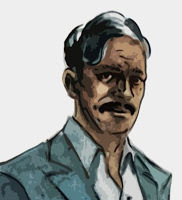 Turner HahnTally ho, me hardies!! It is finally out. Finally out! After nearly two years of waiting around drumming my fingers and pulling what little hair I have left in my head out.
A Taste of Old Revenge
is finally out! (check right and see the cover)
Turner HahnTally ho, me hardies!! It is finally out. Finally out! After nearly two years of waiting around drumming my fingers and pulling what little hair I have left in my head out.
A Taste of Old Revenge
is finally out! (check right and see the cover)The year after god invented dirt I came up with the idea of developing Turner Hahn and Frank Morales . . . the two homicide cops that are the main go-to guys in this book. Uh . . . . maybe I'm stretching the time line a little bit about when Turner and Frank came to mind . . . but you get the general idea. It was some time ago.
I've been reading the detective/mystery genre for more than . . . . uh, hell! That long?! . . . . fifty goddamn years! Half a fracken century. And yeah, over the last fifty years I've seen a lot of trends come and go in this venerable old fart of a genre. Some good. Lot's on the 'what the hell!?' side of the coin.
Take, for instance; the 'main chartacter' or 'hero' of our imaginations. Over the years we've seen the demise of the Phillip Marlowe kind of guy . . . you know, the honorable wreck of a near-alcoholic who fights in the back alleys of crime trying to right the world in a world that doesn't care anymore . . . to the certifiably homicidal killer molded in the guise of Lee Child's Reacher, or Robert Crais' Joe Pike. Or we have Robert Ludlum's Jason Bourne. (note how I put the spy/adventure sub-genre into the mainstay of mystery/detective? Sorry, that's just a tic of mine).
Don't care how you want to slice and dice it; look deep into the psyches of all three characters listed and you have to agree these guys would rather kill you than look at you. Not that I'm saying it bad, mind you. So happens I like to read all three of them. With my preference leaning toward a good Jason Bourne tale.
But the point is this; what happened to the honorable, traditional, god-I-need-one! . . . traditional hero?
I think it's time to resurrect'em. Sure, there are authors and characters out there that I haven't read that will undoubtedly fit this bill. But when Turner and Frank came along I hadn't seen one for decades. I read and read and never found a story, or a character, I truly thought satisfied the needs I had for a good book/series/long term relationship.
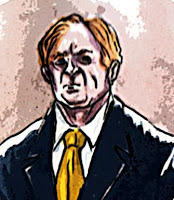 Frank Morales
Frank MoralesSo I decided to create them. Two of them. Make them homicide detectives. Make one just as good, and as interesting, as the other. Make both of them have their own unique characteristics. Individually Turner Hahn is an equal to Frank Morales when it comes to solving a homicide case. Neither plays the traditionally second-fiddle to the other. Each bring to the detective team talents uniquely their own. Not the least of which is their respective sense of humor.
Yeah. A little humor in a good 'whodunit.' What the hell! Don't care what the 'experts' say; I find that a little humor in even the darkest of stories makes the darkness even more bleak . . . and the story even more compelling.
In A Taste of Old Revenge Turns out to be a three-dimensional human being. You find out that he has his weaknesses as well as his strengths. You find out about what happened to his mother and father. About the farm he grew up on. About suddenly becoming unimaginably rich. And about what the sudden acquisition of vast wealth does to his relationships with his peers in the police department. And you get to meet Turner's grandfather. Brother, are you in store for a surprise here! Gramps is one interested dude.
You get to meet Frank Morales' wife. His kids. You get to taste and appreciate Frank's intellect. He may look like a genetic throwback to pre Cro-Magnon Man . . . but the guy is one smart critter! Best of all, you get to see Frank as the head-investigator in his own homicide case. See how he ticks. See how he moves.
I like these two guys. Each is what I think a 'hero' should be. Each have their own foibles. Their own susceptibilities. Their own strengths. But at the end of the day you'll come to two definite conclusions. They are both interesting to be around. And they are both honorable.
There are a number of Turner/Frank novels coming down the pike. At least three more novels in the immediate future already started. I'm crossing my fingers and hoping A Taste of Old Revenge will kick start the series into high gear.
But really, that depends up to you, the reader, doesn't it?
But hell! What do you have to lose by throwing down five bucks and loading it up on your e-reader? Ya can't even go to McDonalds and have a burger and fries for five bucks! Give'em a try. I betcha ya won't be disappointed.
Published on December 06, 2011 08:44
December 3, 2011
Another friend of mine
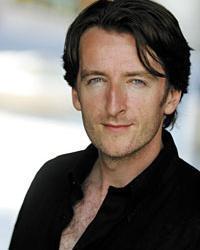 Good lord, recently I've been on a roll. In the last couple of months I've interviewed some big names in the noir/ hard boiled/ historical-detective fiction world. Guys like Richard Godwin, Vincent Zandri, Jason Michel. And there was the amazing feminine master, I.J. Parker. This time I add another superlative writer to the list.
Good lord, recently I've been on a roll. In the last couple of months I've interviewed some big names in the noir/ hard boiled/ historical-detective fiction world. Guys like Richard Godwin, Vincent Zandri, Jason Michel. And there was the amazing feminine master, I.J. Parker. This time I add another superlative writer to the list.Matt Rees.
Matt is another one of those world traveling international reporters. Matt lives/work in Jerusalem. His beat, for years, has been the Israeli-Palestinian conflict. It's been this generations-long conflict which made Matt become an international best seller.
Matt created a character by the name of Omar Yussef. A Palestinian refugee. A teacher by profession who suffers along every day through the pain and suffering that is an houly occurence, it seems, in the Gaza Strip.
What I like about the character Matt has created in Omar Yussef is this; the man is basically a humane, gentle soul forced to overcome his fears of violent reprisals both from the many factions found in the Palestinian movement, and from the Israelis, and confronts those in power to demand justice. Demands that those who murder are captured and tried as the criminals they are.
But Matt also has written other novels. Novels about as far away from the Gaza Strip as one can get. Currently his Mozart's Last Aria. And yes, me puppies, the book is about Mozart.
So I thought it'd be great to interview the guy and pluck his brains to see how he ticks. I think the results are fascinating. I believe you'll agree with me.
1. I'll admit it enthusiastically; I am an Omar Yussef fan. Omar is a Palestinian-teacher-turned-reluctant detective. Where, when, and how did this character come into being? And how successful has his mysteries been in your writing career?
You're very kind, B.R. Omar was born out of my sense that the reporting I did for Time Magazine during the Palestinian intifada was unable to contain the full reality of what I witnessed as Palestinian society destroyed itself. It became a gangster reality, which I was able to tip at in news stories. But to truly encompass that reality, I'd have had to write about it again and again – journalism doesn't really deal in such continuity. Moreover I wanted to get at the emotional reality of life under such extreme circumstances for the Palestinians I had come to know well. Journalism is supposed to stay on the surface, to be objective. I had enough of that. The first Omar Yussef novel "The Collaborator of Bethlehem" won a Dagger from the Crime Writers Association in the UK. The books have sold in 23 countries. So I'm pretty happy with them.
<><><><> </>
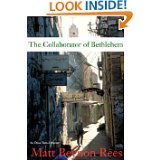 <><><><> </>
The Collaborator of Bethelem
<><><><> </>
<><><><> </>
The Collaborator of Bethelem
<><><><> </> 2. You are a Western reporter living in Jerusalem. You see the chaos of the Palestinian/Israeli conflict on a daily basis. How does this energy bleed into your Yussef novels, and will Omar ever witness a better set of circumstances for his people?
In some ways Omar already sees things as they might be, and in a positive way. That's why I made him a schoolteacher. He's there to protect his society against ignorance, just as a detective aims to protect against criminality. I don't foresee writing about immediate circumstances of peace and prosperity for the Palestinians, because it's just not on the horizon. I wanted to show that Omar lives for that day, however, and that's why his favorite granddaughter is such an important secondary character. All the risks he takes are an investment in her future.
3. Recently you wrote Mozart's Last Aria. What were the factors that came into play which compelled you to write this?
<> </>
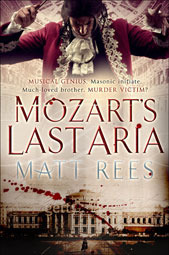 <> </><> </>
Mozart's Last Aria
<> </><></>I've always loved Mozart, but his music became more important to me during the intifada. I was in some ways traumatized. My reaction to trauma was to lose my temper to a crazy extent. When I listened to Mozart, I felt calmer. I took a break from covering the intifada to visit Austria with my wife – we were looking for a place that was organized, peaceful and beautiful, as a change from Israel and Palestine. We passed through a small mountain village where Mozart's sister, Nannerl had spent her married life. I visited her house and saw that she looked exactly like her brother. Naturally that got me thinking about plot opportunities. But I also felt called by her, as I stood at the edge of the lake at the bottom of her garden. Called by a talented woman who had been consigned to this backwater while her brother achieved fame in the Imperial capital. I wrote the book for her.
<> </><> </>
Mozart's Last Aria
<> </><></>I've always loved Mozart, but his music became more important to me during the intifada. I was in some ways traumatized. My reaction to trauma was to lose my temper to a crazy extent. When I listened to Mozart, I felt calmer. I took a break from covering the intifada to visit Austria with my wife – we were looking for a place that was organized, peaceful and beautiful, as a change from Israel and Palestine. We passed through a small mountain village where Mozart's sister, Nannerl had spent her married life. I visited her house and saw that she looked exactly like her brother. Naturally that got me thinking about plot opportunities. But I also felt called by her, as I stood at the edge of the lake at the bottom of her garden. Called by a talented woman who had been consigned to this backwater while her brother achieved fame in the Imperial capital. I wrote the book for her. 4. Writing and writers in general; what makes a writer, for you, worthy of reading? Are there any pre-requisites a writer needs in order to be successful (in any genre)?
Writers seem to me to be some kind of introverted version of an actor. They need to inhabit a character, just as a method actor might. So I think writers are the introverts of the creative world, which makes outsiders particularly suited to writing. I know I felt that way growing up and for much of my life. Now I'm a Brit living in Jerusalem. Still an outsider. I think of Hammett, who was a Communist, and Chandler, who was just rather prickly, amongst others. All outsiders. If your life has been a stroll in the sun and everyone always loves you, I don't think you'll have much to write about.
5. As a follow-up question for question No. Four, what are the parameters for a good mystery/detective novel? Is it plot? Characters? The crime? All of the above? None of the above?
Characters are the emotional core of a novel, so they ought to come first. However, a good intricate plot is a great way to provide them with conflict and really bring them out. I don't care if someone figures out the plot halfway through one of my books – and I don't believe anyone who says they do, anyhow – but plot is a vehicle, in my opinion, for dramatizing character. I also think a writer ought to undermine the genre a little bit. One of my ways of doing this is to have two or even three endings. You think you've got the solution, then someone else turns out to be even more guilty, then we realize something else entirely is going on. That mirrors reality as I've come to see it. It also jerks the reader out of the cosy complacency that often inhabits even the most frosty and bloodthirsty of crime novels.
6. When will the fans of Omar Yussef get to see another Palestinian caper? And what is the long term diagnosis for the continuation of this series?
I've finished a novel about Caravaggio, the Italian painter, and I'm working on a thriller now set in Iraq and New York about post-traumatic stress disorder. So Omar'll have to wait a bit. I have an idea for a book in which he comes to Jerusalem…
7. Have you ever thought about writing a counterpart to Omar Yussef from the Israeli point of view? It would be a kind of counter-balance, and quite interesting, view of how this part of the world sees itself.
I do have an idea for an Israeli novel. It wouldn't be a detective novel per se. Something a little different… I hope it'll be the one after the one I'm writing now… I want it to be a novel centered on Israel but encompassing the whole Middle East. Israel itself is a bit parochial; thinks it's the most important place on the globe. I don't find that a compelling scenario for fiction.
<><><><> </>
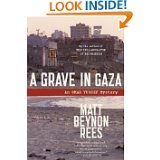 <><><><> </>
A Grave in Gaza
<><><><> </>
8. What else is in store for the fans of Matt Rees' writing? Another book on a famous composer? Maybe something out of the mystery/detective genre altogether? Care to share any musings along this line of speculation?
<><><><> </>
A Grave in Gaza
<><><><> </>
8. What else is in store for the fans of Matt Rees' writing? Another book on a famous composer? Maybe something out of the mystery/detective genre altogether? Care to share any musings along this line of speculation?
After MOZART'S LAST ARIA, I've written another book that turns on the mysterious, unsolved demise of a favorite artist of mine. Caravaggio disappeared in 1610 when several murderous people were on his trail in a series of vendettas. It was too good to resist.
This is Matt Rees. A wonderful writer and an articulate person to boot. You should look into his writings. You'll be happy you did.
Published on December 03, 2011 10:37
November 30, 2011
Yes, this is a friend of mine
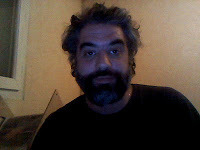 Yes, this is the face of an accomplished writer, blogger, and emagazine publisher. Add 'friend' to that list as well.Meet Jason Michel. The man who is behind the fabulously successful emag called Pulp Metal Magazine. By the way, he's another one of those mad Brits. Why is it that all the Brits I've met who have a fondness for dark noir also have this dark, twisted sense of humor that is so close to my own? Am I a Brit in disguise? Or maybe . . . just maybe . . . all of the writers I've met so far hailing from that little island are related to me?!
Yes, this is the face of an accomplished writer, blogger, and emagazine publisher. Add 'friend' to that list as well.Meet Jason Michel. The man who is behind the fabulously successful emag called Pulp Metal Magazine. By the way, he's another one of those mad Brits. Why is it that all the Brits I've met who have a fondness for dark noir also have this dark, twisted sense of humor that is so close to my own? Am I a Brit in disguise? Or maybe . . . just maybe . . . all of the writers I've met so far hailing from that little island are related to me?!Hell! Now THAT'S a scary thought!!
Anyway . . . Jason and I crossed paths about a year and a half ago when I sent him a Turner Hahn/Frank Morales story. He liked it and used it immediately. So, being the glut for pain as I am, I hacked together a few more stories and sent them off to PMM. He published them all and I thought . . . sonofabitch! I might be a writer after all!
And then one day he sends me an email asking if he could use one of the stories I sent him, a Turner/Frank story entitled 'Odd Way To Order Carry Out,' for an anthology of PMM stories he wanted to put together. The first collections of PMM stories is called Laughing At The Death Grin. Some great authors are in this collection. Both surprised and happy that I was asked to join this montage of excellence.
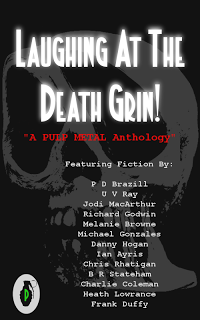 Hitting him up for an interview was a no-brainer. I had to ask him why in the hell would a sane man want to put himself thru hell and create an emag like PMM? His answer, I'm sure you'll agree, will conclusively certify that all Brit writers are insane. (grinning and winking)1. Writer, short-story collaborator, e-magazine publisher. Which came first? Which do you prefer to think of yourself the most?
Hitting him up for an interview was a no-brainer. I had to ask him why in the hell would a sane man want to put himself thru hell and create an emag like PMM? His answer, I'm sure you'll agree, will conclusively certify that all Brit writers are insane. (grinning and winking)1. Writer, short-story collaborator, e-magazine publisher. Which came first? Which do you prefer to think of yourself the most?#1 Well, first came the paranoid megalomania and the overwhelming desire to become a villian in a sixties spy flick. That, of course, still perfumes my every waking moment, MR BOND, um ... , I mean, BR.
Well, to answer the bloody question, the writing came first. Short stories, of course. I actually started off with the intention of never publishing myself. I thought that that way I could be completely free in my writing and never have to pander to any other fucker.
Of course, that way you can sit around in your underpants feeling smug that you are REAL and not like the corporate soul sucking whores making money with mediocrity.
A fantasy and intellectual cowardice was what it really was but it was a good way of honing in on my own way of writing. It gave me the courage to start sending them off.
Then I finally got one published in the now legendary SCARECROW magazine, run at the time by Lee Rourke and Matthew Coleman.
After that there was no stopping me. As for what I think of myself ... A hack suits me fine.
2. Donning the magazine editor's hat, tell us; what makes for a good short story? What do you look for when you're deciding what to publish?
#2 Of course, taste is all subjective. I have actually chosen stories that didn't slap me across the face with their ideas, but I knew that they were beautifully written and that other people would really appreciate them.
But, the ideas and the vibe of a story are something that I really like. Writing deals with the imagination and the atmosphere of a story plays with the mind and what we see in there.
Give me something unexpected. A twist. A line of dialogue that makes me spit out my mouthful of Merlot over the computer screen. Or a scene that makes me feel downright spooked.
A bloody good yarn helps.
3. How did Pulp Metal Magazine come into existence? Did you wake up one day and say, "Hey! I want to be a magazine editor and waddle through 10,000 pages of drivel just to find ONE good story!" Uh . . . are you crazy?
Actually, that's pretty accurate, except I was drowning in an godawful hangover and then this pernicious thought hit me.
I still think the gods are torturing me somehow ...
I blame Paul D Brazill for agreeing to a column, after that, who could refuse!
4. When YOU craft a story--what do you go after? Plot? Character? Innuendo? Emotions?
#4 Ooohhh, I don't know. The vibes, baby, it's all in the VIBES.
One of my favourite writers was the late great Hunter S Thompson (RIP, Mr Duke). I loved his style of getting right down deep and dirty inside the subject himself. Becoming the story. That's how I approach ideas. Attack the fuckers from all sides and see where they lead. Live them metaphorically and at certain times in reality.
It's hell on a relationship, let me tell you.
When you open the door to the bedroom and scream BUT I MUST KILL HIM! IT IS THE ONLY WAY!
That can even send the cat running under the sofa
5. You have a set of classic Pulp Metal Magazine stories out called Laughing at the Death Grin. Why did you decide to go this route? Was it hard to decide who to put in? Has it surprised you on the success or failure its garnered so far? Is there a 'Masks 2' going to come out?
#5 LATDG was actually a logical extension of the magazine, as is the whole PULP METAL FICTION malarky. It just made sense with the whole ebook thing kicking a hole in the arse of the trad publishing route.
Sales have been slow but do we want instant gratification or a long burner here?
I am in negotiations with a couple of other well known PMM faces to put out anthologies of their work with a couple of all new original stories in for good luck.
Not telling you anything else yet.
So there.
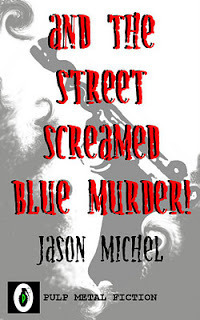 6. What's next for you in the literary world? More short stories? Maybe a ground-breaking novel? And while we're at it . . . what's next on the evolutionary trail for Pulp Metal Magazine?
6. What's next for you in the literary world? More short stories? Maybe a ground-breaking novel? And while we're at it . . . what's next on the evolutionary trail for Pulp Metal Magazine?#6 Um, my novel Confessions Of A Black Dog was published last year in the US and my self published book of shorts is still available on Lulu as an ebook, just because I've been too lazy to take it off. I may put a revised version of that out on PMF in the future.
I've also just released my novella AND THE STREETS SCREAMED BLUE MURDER! over at PMF.
I'm also still working on my Stories From Old Lurk site, which is the most fun I've had writing for a long time, total freedom. Developing the weird and wonderful world of Old Lurk and that multi-dimensional cad - Vincent Blake just makes my knees tingle.
I've also got the germ of an idea to the follow up to the novella.
Besides that I'll be planning to hold the universe to ransom for a while to come ...
(We're in the white mode today because issues . . . lots and lots of issues. Mostly mine. And yes, I am taking my medicine. Again)
Published on November 30, 2011 13:03
November 28, 2011
My Interview with The Boss
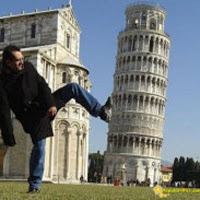 Up front, just to let you know, one of the publishers I work with is Trestle Press. An upstart, new, really visionary epublisher just getting into the full swing of things.I'll just say that . . . somehow . . . I got in on the ground floor of this new publishing house and am glad I did it. The 'Head Fred' (capo de capo; alias, 'the publisher') of the organization is a guy by the name of Giovanni Gelati. Now, what can I say about Giovanni that hasn't already been said? He's enthusiastic, brimming with ideas, creative, funny (in a morbid kind of way. You should read some of HIS writing to fully understand!). Best of all, he's a hard working visionary who actively takes in ideas and suggestions from his growing stable of writers and uses them to their maximum limits while asking for more ideas to bounce his way.
Up front, just to let you know, one of the publishers I work with is Trestle Press. An upstart, new, really visionary epublisher just getting into the full swing of things.I'll just say that . . . somehow . . . I got in on the ground floor of this new publishing house and am glad I did it. The 'Head Fred' (capo de capo; alias, 'the publisher') of the organization is a guy by the name of Giovanni Gelati. Now, what can I say about Giovanni that hasn't already been said? He's enthusiastic, brimming with ideas, creative, funny (in a morbid kind of way. You should read some of HIS writing to fully understand!). Best of all, he's a hard working visionary who actively takes in ideas and suggestions from his growing stable of writers and uses them to their maximum limits while asking for more ideas to bounce his way.I dunno . . . if you get the impression I kinda like the guy . . . you may have something there.
Everybody interviews authors, artists, and politicians. But who interviews the guys who sit in the background doing the day-to-day work of making a publishing house successful? Hint: it's done rarely.
So I thought I'd go against the grain a little bit and do just that. Interview the boss, if you will. The traditional 'six questions' (except this time it turned out to be seven questions). Hope you like it. I enjoyed myself arm-twisting the guy to pony up with some answers.
1. Trestle Press is becoming a huge success. The stable of writers being recruited is rising at an exponential rate. How did Trestle Press come into existence? We created it so an exceptionally talented author like yourself and others could find a home and a place to build their "platform" and "brand". My kids laugh at me when I use words like that. The idea and genesis for this came from me listening and reading stories from authors and readers looking to find each other. For author's, Trestle Press is a nice place for them to be creative, free thinking, and a home for their hard work. For readers, a place that they know they can go to get high quality reads at affordable pricing. I am going to think it is beginning to work, we are fortunate enough to have a number of our titles hit the sales charts on Amazon Kindle and Amazon UK, many within hours of release. As I write this "Amish Knitting Circle" is the #1 Short Story on Amazon Kindle (in the short story category) and the entire series (all 4 of it installments) is the most read digital short story series (in the short story category) in the world today. 2. What motivates you to succeed? And why this drive to succeed in the publishing world? You know B.R. I really like you, why the hard questions? I am not a very deep thinker. My wife once said of me, and I quote:" You are like a dog with a bone". Now I take compliments when I can get them; I look at that with a positive twist. But to sum it up quickly: I think the world is ready for the readers to control author's destinies. I am driven to make sure that authors like you and all the Trestle Press authors find their place and their audiences. Your stories are intense, vivid, and amazing; I can say that about ever author I have the good fortune of working for. 3. You show a wide range of literary taste. Tell us, if you had five books on a table in front of you, (a hardboiled detective novel, a romance, a comedy, a religious/ spiritual selection, or a traditional novel of literature) which would be the one you would choose to read first? Do you have any preferences? I am not sure I could recognize literature if I fell over it, not my speed. If by "literature" you mean something from Billy Shakes I will save that for last without a doubt. Romance makes me blush, so that would go on top of that, next to last. The religious stuff, I need to read slowly so I can reflect on it, so I do it in chunks. I enjoy it very much, but going back to the deep thinker thing, I need to digest it a bit, so it takes me longer. Comedy? I am always up for a good bocce story, do you know any of them? A little birdie told me that a new one just came out-"Holy Chrome Bocce Ball Beach Bloodbath". I guess that leaves the nasty stuff for the top. Thankfully you and the rest of the crew at the soon to be "Dark Pages Press" turn out great stuff every week.
4. Recently Trestle Press has decided to expand and create separate imprints with each imprint specializing in one particular area. Tell us about this Dark Pages Press 5. Currently Trestle Press is an ebook publisher. Will expand into the print world? What are the pros and cons a new company like Trestle Press may face if they make such a decision. Paper is not going anywhere, people's desire to hold a book in their hands I don't think will ever go away. Don't get me wrong, I have a sincere fondness for my ereader and love reading on it. The print thing, well, without going into much detail here, we are going to be putting our own spin on that to. We are going to do the "normal" thing first with some of our full length work like your "Death of a Young Lieutenant" and "Roland of The High Crags: Evil Arises" but after we get that rolling, well let's just say the fun will begin. Everybody can expect to have our first print books in time to have them underneath the Christmas trees and in their hands for New Years eve. 6. What are you looking for when a writer submits something to Trestle Press? Is it just the words on the screen? The way they tell a story? Or are other factors in play as well? I have OCD, I am pretty up front about that. I am the kind that is always thinking, and the best way for me to organize myself is with lists. I have lists for a lot of stuff. It is a running joke with my wife, but you know it what makes me stay sane. I mean I do work for you, right? Ha! Just had to get that in there ,I didn't know if you were asleep or not. You want to know what I look for. It is not one thing, can't be, if it was all about the read, then no it wouldn't work. To me it has to be the whole thing, the whole person, the entire author, from top to bottom. How do they think? What is their motivation? Let's just say I have a full index card with what I am looking for, at least 20 different things. Does each and every author have all of them, no? Everybody has strengths and weaknesses, gauging them are the key, using them necessary. I haven't had the card laminated yet, I may add a few things to it, but , no you can't see it. Sorry. It is like the remote for the Television, you need to marry one of my daughters to touch it. Simple rules, I think they make sense.
7. Where do you see yourself and Trestle Press in the next 10 years? B.R. you really are trying to make my head explode aren't you? I hope that I am doing the same thing I do every day, helping authors and readers find each other. That is a lot of fun. ////
It's a good feeling knowing you're with a publisher who trusts your ideas and is willing to work with you. Here's to the idea of bigger and better things for Giovanni, Trestle Press, and their new imprint, Dark Pages Press! (raising a glass of two-day old Coke Cola)
Published on November 28, 2011 08:39
November 26, 2011
Vincent Zandri checks in for a few questions
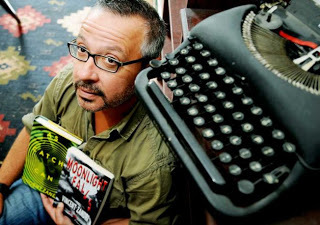 Krikies!I asked Vincent Zandri, that world-hopping, e-publishing wunderkind of a writer/reporter, if I could throw at him the nominal six-questions for an interview. Be damned if didn't say 'Yes' and agree to it almost immediately.
Krikies!I asked Vincent Zandri, that world-hopping, e-publishing wunderkind of a writer/reporter, if I could throw at him the nominal six-questions for an interview. Be damned if didn't say 'Yes' and agree to it almost immediately.Vincent is a publishing success. In both traditional print, and more importantly, in epublishing. He has at any one time two or more of his numerous books in the Top 100 rankings in Amazon, and have kept his titles in the Top 100 for a year or more. Obviously he sells bazillions and bazillions of books.So that makes him a success.
He has this success because he is a damn writer. His reporter's training has taught him well in sniffing out a good story and filling in the details. You start reading a Zandri novel and you don't stop until you get to the very end. That, to me, is the mark of a great writer.
So being the jealous type that I am (aaaaaaaahemmmm!!) I thought I'd pick his brains and see if I could get a glimmer of an insight in what makes him so good. I think you'll find the conversation quite interesting.
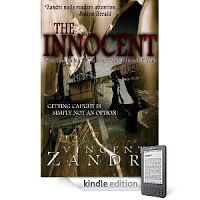 The Innocent
The Innocent
1. Luck. After reading your bio and some other articles you've written about your life, I am struck by the streak of luck that's come your way. Undoubtedly talented--no question about that--but talk, if you will, about the quality of luck, or the lack of it, that affects a writer's life.
Good question…I believe that good luck is like boxing. You keep jabbing enough you're eventually going land one or two. And if you're really lucky, you might even land a round-house and knock the poor son of a bitch on his ass. That son of a bitch in this case being this whole crazy writing game of words, pages, books, agents, publishers, critics, editors, predators, sales, and that elusive next book you're going to have to write. Because remember, it's never what you've done. It's always what you're doing or about to do. Those who can't write another book after the one before are suffering from miserable luck. Which leads me back to the original question. Stay in the business long enough and you will experience streaks of good luck, and just as many if not more, valleys filled with bad luck. You treat the former with a good dose of salt, and the latter with a good dose of booze, travel, reading, women, and just plain living life.
2. It seems to me you base a lot of your stories off real life incidents. Is that a by-product of being the journalist in your life? Or would have you followed this tack even if you were, say, originally a plumber?
There are real stories that genuinely disturb me, not as a journalist necessarily but as a writer and a human being. When some money-hungry college kid who comes from a nice town and a nice home can climb the stairs in the middle of the night and enter into his parent's bedroom with a fireman's axe and proceed to bash their brains in with it, I find myself doubled over in pain on behalf of human kind. Sounds a little dramatic, but certain stories have to be told. As a journalist I almost consider the fictional technique of telling a real story as a fiction in line with the more narrative non-fiction writing style invented by Capote in In Cold Blood and later turned into Pulitzer Prize winning fiction by Norman Mailer in The Executioner's Song. When you write plain reportage you're going to miss out on a lot of speculation. In other words, what was going on in the killer's mind at the time of the incident; what did it feel like to bury an axe into your dad's skull and then pull the blade out. These things need to be dramatized and imagined if we are to better understand the human condition of pure evil. I guess in the end, it comes down to that old adage: You can't make this shit up if you tried. There are just too many real life stories out there that need to be told. I don't need to write down a single novel idea ever again for as long as I live.
3. In your bio you've mentioned how you are a workaholic when it comes to your writing. You DO produce a lot of work in a relatively short time. Good stuff, I might add. This dedication to your writing--do you think this is a requirement all writers must have? Or is it just a quirk of your own personality?
Writers and would-be writers have to ask themselves one very important question: Do I want to be a professional full-time writer or do I want to be a part timer? There's no right or wrong here obviously. There are always going to be those full-timers who work all the time who will barely eek out an existence, and those who write only one or two books in their lives who win Pulitzers. You never can tell. But to be honest, almost no one ever succeeded in this business by doing it half assed. In Hemingway terminology you have to "bite the nail" every day. There's always going to be the "John Locke's" of the indie world and the James Fry's of the major pub'd world who hit homeruns more or less on their first try out (Ok
4. Apparently you have an agent who has bought into the world of ebooks and epublishing hook, line, and sinker. Is this unusual? And are you happy with the results so far?
Ironically that agent quit the agenting business and went into e-book publishing. I am pleased with what she's done in negotiating my contracts with the Stone Inks, even though at first I was entirely ignorant to the e-book process and what's been happening. When I originally signed, I thought, I'll never make a dime from this. Then a few months later I was selling more books than Harlan Coben. Go figure. But like anything else, the success if cyclical. But I have to say, sales are still steady. It all resulted in a major deal with Thomas & Mercer who bought out my back list and two new books. And who could ask for anything more?
 Concrete Pearl
Concrete Pearl
5. So many writers of noir/hardboiled, both male and female, are taking the female POV role for their main characters. In a word----why? Whatever happened to the Mickey Spillane characters of the world?
Nice loaded question BR and you know what? I'm gonna take the bait. Well, the answer is this: women read. Men don't. Plus it's fun living inside a woman for a change, 28 day cycle and all. Women are far more dominant in today's society than in previous decades. Ok, I know I'll catch a rash of shit for that statement, but there are simply some hot, sexy, bad ass women out there who can truly fuck you up if you get rough with them and then fuck you to death if you are nice to them. Not to push my own work, but that's where I came up with my character Ava "Spike" Harrison of CONCRETE PEARL. Hot, sexy, smart, and able to kick your ass in a New York minute, Spike is entirely independent and self-assured, even if she is entirely up against it in the plot-driven thriller. Ok, how's that for some shameless advertising?
6. I've asked this to a number of European writers. So I'll ask the same question to you; Writing styles; do you see any similarities or differences when comparing European noir/hard boiled to American noir/hard boiled? For instance the subject of humor has
come up. British writers think they put more humor in their writing. True? False? Maybe? What are your thoughts?
I don't know. Not only don't I spend time comparing them (the writing school prof's do that), I don't get to read a whole of them simply because I don't get to read as much as I want to these days. I do read Max Frisch's stuff over and over again (he's Swiss and German), may the Lord rest his soul. I love Peter Robinson. I'm really pumped to see how well Russel D. McLean is doing as a young noir up and comer and I've blurbed titles for London's Richard Godwin. Let's face it, the Brits and the Europeans have always been ahead of the curve when it comes sex, humor, and just not being pent up in your panties. Remember Monty Python???? But so much of the beauty of noir and hard-boiled fiction lies in its regionalism, it's sometimes hard to categorize anyone into something like, Well, he's a Brit so he writes funnier than say some dude from L.A. like Charlie Huston who is actually very funny but dark as hell, or a brooder from NYC like Andrew Vachss. And then there's Zeltserman who is Boston but not as Boston as Parker, and Zandri is Albany, New York even if he doesn't live there full-time anymore. I actually have a new book in the quirky Dick Moonlight series coming out from Thomas & Mercer takes mostly takes place in Florence, Italy because I spend so much time there now and the regional effects have had a major impact upon me as a writer. Anyway, I'm entirely sure I offered up a fucked up convoluted answer. Bu the simple answer to this question is this: True…False…Maybe…and All of the Above.
Vincent Zandri is good. Very good. You need to find him and read his books. You won't be disappointed.
Published on November 26, 2011 09:05
November 24, 2011
A Snippet from my next novel
 A Turner Hahn/Frank Morales novel is coming within the next two weeks. Called 'A Taste of Old Revenge.'You know about Turner Hahn and Frank Morales. I haven't been shy about extolling their virtues and hang-ups in this blog. I've preached long and hard about these two guys were the first characters I came up who seemed to stick with the reading public (as small as that reading public may be). So I thought I would . . . . kinda . . . prime the pump a little bit and offer a snippet out of the book's first chapter.
A Turner Hahn/Frank Morales novel is coming within the next two weeks. Called 'A Taste of Old Revenge.'You know about Turner Hahn and Frank Morales. I haven't been shy about extolling their virtues and hang-ups in this blog. I've preached long and hard about these two guys were the first characters I came up who seemed to stick with the reading public (as small as that reading public may be). So I thought I would . . . . kinda . . . prime the pump a little bit and offer a snippet out of the book's first chapter.The novel is actually two homicide cases packed in one book. Totally different; completely unrelated. One homicide has Turner and Frank trying to figure out who would want to kill a survivor of a German concentration camp . . . execute him formally while he sat in a small office of his classic car garage working alone one night. By time it's over with the Mossad, the FBI, some unknown Federal Government spy agency, and a long-since-dead organization called ODESSA gets involved
The second case involves millions of dollars stolen out of Iraq--a seemingly random killing of a convenience store clerk by a madman--a genius who has created the first truly sentient artificial-intelligence software--and greed. Simple, pure greed.
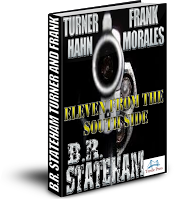 Neither case is just a simple homicide investigation. Simple investigations of homicide are not the cases Turner and Frank get themselves involved in. You can check that statement out quickly enough by looking at the eleven short stories in
Eleven from the South Side.
Neither case is just a simple homicide investigation. Simple investigations of homicide are not the cases Turner and Frank get themselves involved in. You can check that statement out quickly enough by looking at the eleven short stories in
Eleven from the South Side.
Here's a snippet of the opening chapter of the novel. Thought I might share it with you. Maybe get the taste buds salivating. You know . . .
Chapter One
A stale breeze played through the dead man's hair. An unwanted breeze.
A breeze filled with malaise. The old man was slumped across the open cavity of an accounts ledger, his face squashed between the pages of a thick accounting book. The body looked remarkably like a piece of trash carelessly tossed onto an old kitchen table. Or maybe like a discarded broken doll long forgotten by the one who had once loved it. As I bent down for a closer inspection I could see a clearly defined hole in the back of the old man's hairless cranium. There was remarkably little blood. What little blood had seeped out had created a tiny rivulet down the man's neck and formed a dark puddle about the size of a man's palm on the brown pages of the accounting book. The blood was not fresh. Inspecting the wound I got the impression of precision. A surgeon's frugality of effort. Or a craftsman's sure touch in a grisly occupation. Standing up and frowning, another impression occurred to me. Premeditation. Coldly calculated and flawlessly executed. And who said a murder had to be messy? The dead man's arms were pushed across the table on either side of the oversized open book. Between the fingers of the corpse's right hand was the butt of a cigarette, with ash about two inches long still clinging precariously to the filter. In front of the ledger was an ash tray almost overflowing with the discarded flotsam usually associated with a heavy smoker. There was a distinct blue haze of cigarette smoke hanging in mid-air above the corpse's head and the room smelled of old tobacco and sweat. Added to the mixture was the sweet aroma of automotive body putty. Above the dead man's head was a single light fixture swinging slightly in the breeze creating a surreal film noir touch to the crime scene. The fixture hung from the ceiling on a long and frayed electrical wire. As it swung in a rhythmic pendulum motion the oscillating light created oddly contorted shadows that danced a frenetic but silent mime across the walls and floor like some madman's macabre nightmare. It wasn't much of an office. In the middle of the room was an old kitchen table, three office chairs, and the dead man. To one side was a dilapidated old sofa so threadbare I could see the springs were about to pop out and give the next person who sat down on it an intimate surprise. In one corner was a set of three six-drawer filing cabinets. The floor was old green tiles worn through to the bare wood in front of the single door, which opened toward the steep stairs. The stairs led down from the office to the main garage floor below. A garage which, for me, held paradise. Below, in the dim half light of a cavern, the cement floor was filled with classic cars from about six different decades and a dozen different countries. It was the cold steel setting on the garage floor that kept singing alluring charms to me. I wanted to forget about the body. Bodies, in my line of occupation, I see almost on a daily basis. But the sensual curving lines of a black '29 SSK Mercedes in the far corner of the shop, and the seemingly plain-looking dark red '40 Ford two-door coupé, captured my full attention. In the middle of the floor was a '52 Buick convertible with its top down, painted pale-blue, with brand new white vinyl interior. The Buick's huge chrome grill gleamed in a lustful display of American excess. The paint was so fresh and the white interior so new I would have sworn it had just rolled off the assembly line. I was like some buck toothed, pimply-faced kid with a pocket full of money, standing in a Buick dealer's showroom and aching to buy my first new car. Sitting next to the Buick was a '64 Chevrolet Corvette coupé stripped down to the bare plastic body and sitting on four rather solid looking floor jacks. The doors were off, the windows were out and it was devoid of an interior. Some artisan was carefully patching the nicks and scratches on the 'Vette's plastic body with the delicate touch of a brain surgeon. It was covered with a coating of red primer and waiting for its first coat of paint. There was a tool bench beside the car's gutted remains and on it were an air hose and a paint gun. At some point during the next two or three days, I thought to myself, someone in this city was going to be the proud owner of an immaculately restored 'Vette. And dammit, it wasn't going to be me. Also on the garage floor was a brown '29 Lincoln sedan, a red '58 MG two-seater, and a massive looking black '41 Cadillac two-door sedan. All of them were in various states of disassembly, with the cement floor around each car littered with discarded body panels and disassembled engine parts. But the jewel in this crown lay underneath an old tarp in a corner of the shop. It was a perfectly restored '49 Jaguar XK-120 in British Racing Green. I have to admit when I took a look at this one I felt sick in the stomach. Looking at that car, holding the tarp over my head as I gazed upon its sensual curves of cool metal, the sight brought back a lot of memories. As a kid living on the farm, the dream of someday owning an XK-120 and touring over back country highways from one end of the country to the next, constantly drifted into my thoughts. Even now, more than fifty years after rolling off the showroom floor, it looked like it could go like hell and scare the bejesus out of every motorcycle cop in the country. But all I could do was admire it and shake my head. Reluctantly I dropped the covering and slipped back into the practiced routine of investigating a murder. Climbing the rickety stairs I kept glancing over my shoulder and grinning in sheer admiration at what sat silently on the floor behind me. But walking into the office and blending into the blue banks of haze floating over the body brought me back to the situation at hand. The city pays me to be a homicide detective. Not an art critic. Too bad. In front of the ragged looking wooden office chair the corpse was slumped in was the empty brass casing of a .22 caliber long rifle cartridge. Frank Morales, my partner, was kneeling beside it and pushing it around with the eraser of a pencil when I walked into the room. He looked up at me when I walked in, grinned, and began clucking like a hen as he started shaking his head. "This doesn't look promising, Tonto," he said, still grinning and shaking his head, "this doesn't look promising at all." I pushed my hands into the pockets of my trench coat and smirked. "I suppose you're gonna tell me it's my turn to grouse through the pig pen." Frank grinned and nodded his head as he looked up and winked. "You got it, pardner. This is our third stiff and it looks like a stinker. I'll play along as the dumb sidekick and do the paperwork. But you've got the brains to figure this one out. And buddy, I got a feeling it ain't gonna be easy." He stood up, still grinning, and dropped the pencil into his shirt pocket before looking back at the body. Frank is about the same height as I am but roughly a foot wider and eighty pounds heavier. He has a head shaped in ninety degree angles, and a nose which is, more or less, spread across his face like someone spreading butter across a piece of bread. He has beady brown eyes, and a chin which is made of reinforced concrete. And no neck. Yeah, that's right; no neck. Just a head and a set of shoulders about the size of a cement mixer. How he swivels his head from side to side I've never figured out. He's not fat but he is large and solid. He's not slow, which surprises a lot of people. His reflexes are dangerously fast and he has two hams for fists which can punch the lights out of an aroused gorilla. He claims he's dumb. But don't believe it, brother. I know his IQ is somewhere around the same numbers the scales in my bathroom say I weigh, and he's got more college degrees than I've got fingers. Some people collect comic books as a hobby. Hell, I collect muscle cars and first-edition, signed books. Frank collects college degrees. He wears clothes like most nine year old kids wear a coating of mud after a summer shower. God only knows if he's ever ironed a shirt. But don't for a moment underestimate the guy. You do and you'll pay for it in the end. And me? Just an ex-jock who almost had a chance to play in the NFL. A dream which almost came true. But now, like so many things, just water under the bridge. Now I am a detective, like Frank, in the South Side Division. I live in a warehouse where I collect my cars and work on them in my spare time. The ground floor is the garage. The second floor is like an over sized loft I've converted into a decent habitat. And get this; I did the work myself. No help. No contractors. Hell, I'm as surprised as you are. I actually have a talent for working with a hammer and saw. And I'm not bad at wall papering and plastering. If this gig at being a cop doesn't work out, who knows? I might start a home-remodeling business.
Published on November 24, 2011 08:35



